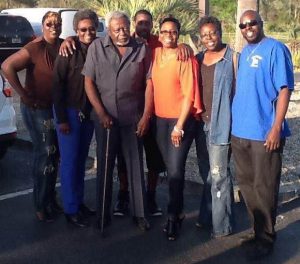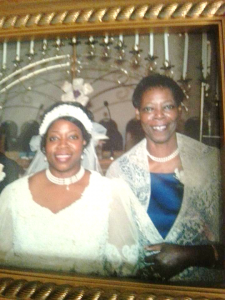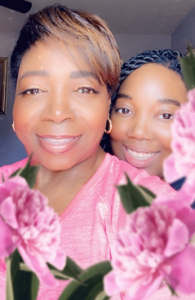Use Holiday Family Gatherings to Share Family Health History

By Demetrius M. Parker
Communication Specialist
CDC Division of Cancer Prevention and Control
Have you ever had an inner voice telling you to take a particular action, like call your friend? And when you did, that friend said, “I was just thinking of you?” Heeding that inner voice can be very beneficial—even lifesaving—as shared by cancer survivor, Celeste Smalls-Sumpter.
A deeply religious person, Celeste recounted that fateful morning of her discovery in February of 1996. “God came to me in a dream and told me to check my breast. I got up like normal, getting ready for work before I had to wake my baby girl, Tatiana. Immediately, I again heard an inner voice say, ‘Check your breast.’”
So, she stopped and checked her breasts. Surprisingly, Celeste found a lump in her left breast. It was the shape of a dumbbell and was about an inch in length. “I was shocked and nervous. I thank God that I listened to that inner voice,” she said.
Again, fortuitously (or divinely, as Celeste would say), she had an appointment with her OB/GYN that afternoon. She told him that she felt a lump in her left breast. Her OB/GYN confirmed he felt the lump also. He scheduled Celeste for an ultrasound that same day.
The doctor who did the ultrasound told Celeste the lump was not cancer. But Celeste asked, “How can you tell if the lump is benign [not cancerous] or malignant [cancerous]?”
Taking Action Because of Her Family History

When the doctor didn’t explain, Celeste believed she needed to take action. As she walked out, she decided to get a second opinion for a biopsy so that she could know for sure. “I was skeptical when I was told it was not cancer because of my family history, I know it was a possibility that it could be cancer.
“My late mother, sister, and late grandmother had breast cancer.” Celeste was adamant about more proof and went to see the breast surgeon who did her mother’s surgery. She was immediately scheduled to have a breast biopsy. Celeste had a lumpectomy and was diagnosed with stage 2B cancer. She was 29 years old.
Celeste and her grandmother were both having radiation treatments five days a week for six weeks. They went together for treatments. Afterward, they were off to share the day together. “Our conversations were priceless,” Celeste recalls.
In 2000, four years after Celeste’s diagnosis, her oldest sister, Sharon Smalls Register, was also diagnosed with breast cancer. Because of the family history with breast cancer, Celeste decided it was now time to gather her two brothers and two sisters to discuss their family health history with cancer. She brought them together and suggested that they each get genetic testing. She shared with them that she wanted them to know for sure whether they were carriers of the BRCA gene mutation. This mutation raises a person’s risk for breast, ovarian, and other cancers. They agreed. She and three of her siblings (two brothers, Harold and LaQuane Smalls and younger sister, Nina Gather) tested positive for the BRCA1 genetic mutation. “I wanted my family to know for sure if they had the BRCA gene. Now, they can decide for themselves how they want to proceed with their lives,” Celeste explained.
Hard Decisions and Persistent Faith
Twelve years later in 2008, after genetic testing and finding out she had a BRCA gene mutation, Celeste decided to reduce her breast cancer risk by having a double mastectomy (both of her breasts surgically removed) and breast reconstruction. After much prayer, Celeste shared her decision with her husband and daughter. “I had a conversation with my husband, Clayton and daughter, Tatiana. The question I faced was not if the cancer would return in my breast, but when. Clayton supported me in my decision to have the surgeries.
“Thank God I got the surgery and that it went well,” she said. “Because, while preparing for the surgery, results from my pathology report revealed that I had stage 2 cancer in the left breast again and stage 0 ductal carcinoma in the right breast.” Celeste was not surprised that she was going down this road again. Her faith in God sustained her positive attitude. After a series of treatments, she is now cancer-free.
Tatiana was 14 when Celeste had the surgery. “Tatiana again was a major motivating factor for me to beat cancer and stay well. I now had a teenager that needed me,” Celeste said. “ I knew I had to beat this and with God’s help. I did in 1996 and in 2008.”
Only You Know Your Body

“So, please, if you don’t take anything else from me as I share my cancer and wellness journey, know that you and only you know your body,” Celeste urges. “Don’t just take what the doctors say if it doesn’t sit well in your spirit! Listen to your inner voice, whatever you may call it.”
Before, during, and after treatments, prevention was a top priority for Celeste. She focused on keeping a healthy weight, getting more physical activity, eliminating fast food, and eating lots of fresh fruits, vegetables, and lean protein. “My focus on diet and physical activity and deepening my faith practice became my lifestyle, not just a temporary fix,” she said. “Also, so very important to my mental wellness journey is keeping positive people around me. My immediate family, and my extended family—including my work and church families—are my partners in living an active, full life.”
Celeste also finds that it helps to share her story and to support others who are going through cancer treatment. “I tell people to listen to their bodies and have faith that there’s a rainbow after the storm. My storm is over now!” she said.
Family health history is a record of the diseases and health conditions in your family. During this holiday season while families gather, take time to ask about your family history of cancer. Visit CDC’s Family Health History website for tips and guidance.
Knowing your family history and getting screening tests regularly may find breast, cervical, and colorectal (colon) cancers early, when treatment is likely to work best. Cancer doesn’t wait. Neither should you.

